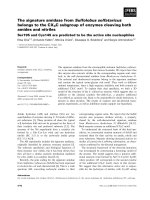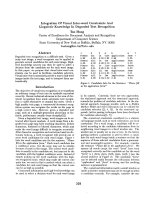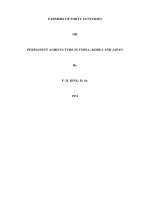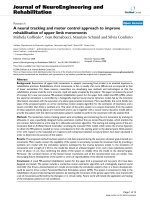The concept of karl popper about civic responsibility in democratic society and there are lessons to be learned from that so as to improve the effectiveness of social monitoring and
Bạn đang xem bản rút gọn của tài liệu. Xem và tải ngay bản đầy đủ của tài liệu tại đây (216.65 KB, 7 trang )
AGU International Journal of Sciences – 2019, Vol. 7 (2), 84 – 90
THE CONCEPT OF KARL POPPER ABOUT CIVIC RESPONSIBILITY IN
DEMOCRATIC SOCIETY AND THERE ARE LESSONS TO BE LEARNED FROM THAT
SO AS TO IMPROVE THE EFFECTIVENESS OF SOCIAL MONITORING AND
CRITICISM IN VIETNAM TODAY
Bui Lan Huong1
1
Hanoi Pedagogical University 2
Information:
Received: 03/08/2018
Accepted: 06/12/2018
Published: 11/2019
Keywords:
Karl Popper; democracy;
open sociey; social criticism;
supervision
ABSTRACT
Karl Raimund Popper (1902-1994) was considered one of the most
influential philosophers in the twentieth century. His socio-political thoughts
left us a number of profound lessons for the social construction of today. This
essay focuses on investigating K. Popper's main views on democratic
societies. Based on the study of his conception on the criteria for a
democratic society and on the role of citizens in supervising and criticizing
the work of government, the author recognizes
valuable lessons for
enhancing the efficiency of social supervising and criticism.
party political system. In the current age, social
supervision and criticism remains one of the most
important issues and requires study, especially in
countries striving for democracy including
Vietnam.
1. INTRODUCTION
In today's social life, the use of supervision and
criticism is indispensable in organizing a
democratic society. Social supervision and
criticism are not new issues. People have been
acquainted with these concepts very early and
made it an effective tool to establish the
democracy, leading to the political development
of any advanced countries around the world.
Vietnam, which is currently in a stage of
innovation and integration, should reform under
the leadership of the Party to eliminate
bureaucracy as well as to overcome irrationalities
in the governmental system at all levels. In order
to do so, it is necessary to have effective solutions
to arouse and promote democracy, openness and
transparency. Social supervision and criticism is
the most effective way, especially in such a one –
Karl Popper (1902 - 1994) is a famous
philosopher of the twentieth century who devoted
much of his time and effort to studies focus on the
building a democratic society. Apart from the
inherent limitations of his democratic ideology,
we can see that the idea of the citizen's
responsibility to build an ideal society as a shining
gem. An objective scientific research on this
content, therefore, is necessary to help us gain
valuable lessons to improve the effectiveness of
social supervision and criticism for all the citizens
in our country today.
84
AGU International Journal of Sciences – 2019, Vol. 7 (2), 84 – 90
2. CONTENT
the case of necessity, to deprive people of
authority without using violence. If there are not
any democratic institutions or if these institutions
are not well-developed and weak, the only way to
monitor and replace the rulers is to bring a
different kind of violence against their violence.
Historically, the establishment of democratic
institutions is of course associated with resisting
militarilist action. From this point, Popper
presented the definition of democracy as follows:
“I understand democracy is not something
indeterminate like the power of the people or the
power of the majority, but it is a system of
institutions ... which allows the social supervision
towards the rulers and dismiss them at the will of
the non-rulers, allowing them to conduct reforms
without the use of violence, even against the will
of the rulers."(Cornforth.M, 2002, p.496)
2.1 Karl Popper's concept of democracy
Democracy is a historical category. Over 2000
years ago, the ancient Greek sage Herodôte first
introduced the concept of democracy in his work
“History”. He explained democracy as "the power
of the people". Thus, democracy is a concept
originating from the slavery period in ancient
Greek society, where the first democracy of
human society was born –Athenian democracy,
deeply influenced the later democratic ideological
movements, especially from the Renaissance to
the present. With a history of more than two
thousand years of development, the concept of
"democracy" has a very rich connotation, but it is
uniform in the basic content of democracy as the
power belonging to the people.
In developing the theory of an open society,
Popper came to a definitive conclusion that only a
democratic and open society which is willing to
receive criticism, to criticize mistakes and to
overcome the shortcomings has opportunity to
improve itself. Therefore Popper also presented
his own concept of democracy. Different from
traditional notions of "democracy", Popper said
that "the important political issue is not about who
holds the power, but about how to supervise the
use of that power. The basic political problem is
not about to whom the power will be given
(because no authority is reliable) but about the
most effective way to monitor power through
political institutions. ”(Cornforth.M, 2002, p.494)
Democracy is the best kind of political system
because it has gone a long way to solve problems,
such as through non-violent measures, in order to
get rid of the weak rulers by voting to remove
them from their position (William Gorton, kn).
While many researchers argue that the principle of
plurality is one of the basic characteristics of
democratic society, Popper stated that democracy
cannot be fully characterized as the rule of the
majority, although the regime of general elections
is the most important one. Because the majority
can be ruled in an authoritarian way. In a
democracy, the power of rulers must be limited
and the standard of a democracy, according to
him: "the rulers - the government, can be
dismissed by the governed without bloodshed.
Thus, if the rulers do not defend the institution in
which they guarantee the minority the ability to
operate for a peaceful change, then their rule is an
authoritarian
regime
”(Popper,
1971b).
Dictatorialism "consists of polities from which the
governed cannot escape in any other way but the
path of a successful revolution" (Popper, 1971a).
Popper's concept of democracy is not as abstract
as the so-called "dominant people" but rather as a
combination of regimes. The combination of
Therefore, refuting the question Who will rule? as
a fundamental question of political theory, he
proposed a new question: How should we
organize political institutions to prevent bad
governance from causing too much harm to
society? Popper said this was a fundamental
question of institutional design. Popper explained
that the greatest preeminence of democracy is that
it ensures the ability to establish supervision of
the activities of the rulers or those of powerful
officials regardless of who they are, as well as in
85
AGU International Journal of Sciences – 2019, Vol. 7 (2), 84 – 90
regimes is: the people can govern the government,
including the electoral regime; rulers’ rights are
limited; the governed have the right to change the
rulers without bloodshed; the governed can carry
out reforms by means of peace and democracy, a
regime empowering or dismissing the rulers’
rights. Therefore, according to Popper, checking
whether the current government institution is a
democratic institution means determining whether
people have established a regulation so that “those
without power can also discuss and examine
individuals in power, supervise their way and
appoint or dismiss them ”(Cornforth.M, 2002,
p.499)
how that supervision can be divided between
classes in society because he ignored the existence
of classes and the ways by which the entire people
conduct and protect the interests of their class
through institutions, including democratic
institutions. Arguments in favour of democracy
would always be false if we ignore the existence
of classes and class struggle. According to
Marxism - Leninism, democracy is regarded as a
form of state that has class nature, so it is
impossible to separate the state from the class. If
democracy as a state regime is directly associated
with a certain ruling class based on a dominant
productive relation then democracy will always
have class nature and will never be purely
democratic for all classes. The class nature of
democracy is reflected in class relations and class
struggles to address the question of who
democracy is for and who democracy and
authoritarianism should be limited to. Each class
explained
democracy,
theoretically
and
practically, by different ways and levels,
depending on their positions, views and interests.
Popper's conception of democracy was built in
parallel with his criticism of violent institutions
and his differentiation between these two types of
institutions. According to Popper, the two most
fundamental characteristics of democratic
institutions compared to the violent ones are,
firstly, the development of a mechanism to
supervise authorized individuals and to eliminate
them if they do not complete their mission and
secondly, the allowance to achieve reforms
without resorting to violence.
However, Popper was very reluctant to divide all
governments into democracy and tyranny. There
is, of course, a clear difference between the rulers
of democracy and those of tyranny. But that does
not mean that we can divide state institutions
clearly into democracy and tyranny simply based
on the difference between democratic and
tyrannic measures. We can only distinguish
relatively to a certain extent to determine the role
of governments in social progress and political
evolution to "democracy and freedom". C. Marx
stressed that the most important thing in assessing
forms of governance is the distinction between
governments in terms of which class relations
they encourage and which class relations they
facilitate.
In presenting his conception of an ideal society
called the “open society”, Popper proposed the
method of building that society in a "progressive
social work". This work is characterized by the
gradual repair and supplement, exploration and
advancement at the same time. The task of
progressive social construction is to reform
society step by step. According to him, the task of
progressive social constructions is to design social
structures, as well as to renovate and use existing
social structures, like the main task of normal
construction is to design, repair and improve
machines. In order to achieve the goal of this
progressive social work, there are two conditions
in terms of the realistic basis: Firstly, economic
intervention; secondly, political democracy. With
these two conditions, Popper concentrated on the
foundation of building a democratic society.
Popper's fundamental limitation in the definition
of democracy is that he defined it simply as
"social supervision of rulers" but did not mention
Thus, when building an ideal society - an open
society, Popper always attached great importance
to political democracy. However, the difference in
86
AGU International Journal of Sciences – 2019, Vol. 7 (2), 84 – 90
his thinking compared to other political
researchers is that he did not consider democracy
to be the goal of social construction but only one
of the two key conditions for building society, in
which the responsibility of citizens to participate
in building democracy is significantly important.
elected by the people and responsible to the
people - protects the rights of individuals, so that
citizens in a democratic society can fulfill their
citizens' obligations and responsibilities and
contribute to the strengthening of society. Citizens
must at least be self-aware about the important
issues that society is facing in order to participate
in discussions and to vote wisely (Popper, 1971b).
According to Popper, the meaning of democracy
is to allow reform without the use of violence.
However, if the maintenance of democracy is not
considered the first priority in any fight on this
battlefield, the potential anti-democratic trends
which always exist can cause the breakdown of a
democracy. A thorough understanding of these
principles should necessarily be attained for the
prevention of the risk that democracy could face.
2.2 Citizens' responsibility in a democratic
society from the perspective of Karl Popper
Karl Popper's idea of civic responsibility in a
democratic society was not systematically
presented or reserved by any chapter. But when he
presented his ideas about an open society, it was
the requirements he made to build, according to
him, an ideal society and the responsibility of the
citizens
in
supervising
state’s
power
implementation and the criticism towards public
policy in an open society that emerged as the most
valuable part of his concept of democracy.
K. Popper particularly emphasized the right to
choose a leader of the people. This concerned his
deep skepticism about any type of centralized
power. Therefore, he accentuated the role of
institutions that can minimize the abuse of power
and the control of power. Popper argued that overconcentrated power will produce degeneration and
the purpose of democracy is to prevent overconcentration and abuse of power. According to
him, a true democracy must be a curb of power,
and the supervision of the people to state officials.
The argument continued that democracy can
balance its many powers by supervision, that
politics is a matter of regime, a matter of law
making, and to ensure democracy it is only
possible by relying on the regime to control
power. Popper proposed two situations where
violence can be used to ensure democracy. First,
only under the domination of violence that it can
be used to fight against violence itself. Second,
after achieving democracy, if a democracy is
attacked by domestic or foreign forces, citizens
have the duty to protest and even use violence.
Popper did not object to the use of violence in
constitution and protection of democracy and
freedom.
The most fundamental difference between "open
society" and "closed society" is the ability of
individuals to rationally respond to the problems
they encounter. Members of a closed society are
forced to act in accordance with orders which are
considered as divinely commanded. The signature
characteristic of a closed society is the belief in
the existence of some certain mysterious taboos or
restrictions. The system of these restrictions is
similar to social laws and similar to the laws of
nature that people must strictly obey and
absolutely must not violate.
In contrast, citizens in an open society must have
a critical attitude towards these restrictions and
make their decisions on the basis of mutual
discussion, based on human intellectual capacity.
The presence of rational criticism principles gives
citizens the ability to consciously guide social
development, and manage the "gradual social
transformation technology", creating state
institutions suitable with the actual needs of
citizens. For that to be achieved, citizens must not
be passively but proactive, as the success or
failure of the government lies in their
responsibility. The democratic government 87
AGU International Journal of Sciences – 2019, Vol. 7 (2), 84 – 90
According to Popper, all issues in an open society
are not predetermined by history, history itself has
no purpose or meaning. The so-called purpose and
meaning of history is created by people. He
insisted that although history itself has no
purpose, we can rely on our own condition to
assign certain purposes to history, “the truth also
does not have meaning, it is our decision to make
a truth is meaningful” (Ly Quoc Tu 2005, p.106).
From such a view, he required us to be the most
responsible for our words and actions, and the
effects of our actions to history. This concept of
Popper, according to him, is fundamentally
different from the point of view of historicalism.
Historicalism proposed that the movement of
history is in accordance with the law of nature,
without the interference of decisions and choices
of individuals and people just need to follow the
footsteps of history. In contrast, Popper argued
that decision makers should be solely responsible,
and not to blame the abstract history for their
decisions. With that responsibility, people should
nourish their logical reasoning and conscience.
so, the supervision established is considered
defected from a democratic perspective. In that
sense of equality, universal suffrage and
representative ruling regime are really the
measure of supervising democratic equality.
Every member of a democratic society has the
equal rights to participate in the elections and to
choose their delegates to position into the
legislature. It means that no class is excluded from
the democratic supervision process. It also means
that in order to be passed by the legislature, the
laws must have equal relations with every citizen,
so that everyone has the right to be legally
protected and should be equally punished for
violation of the laws.
From the above analysis, Popper emphasized the
relationship between freedom and responsibility
in his socio-political philosophy. According to
Popper, an open society is the society that brings
the most freedom. It extends the ability to look for
differences, the possibility for self-consciousness
and personal development. This broad freedom of
action is associated with responsibility for one's
own decisions, as well as the responsibility of the
state on the basis of the idea of participation in
democratic institutions. Only through the
implementation of such responsibility can the
development and maintenance of an open society
be possible. Responsibility here is not limited to
one person's responsibility for their own political
community, but also for global responsibility and
accountability for the future. Therefore, in the
perspective of K. Popper of this subject, we can
find universal and intergenerational ideas to
enrich the debate about justice.
Thus, for Popper, citizens in a democracy have
not only rights, but also responsibilities to
participate in the political system. In turn, the
political system protects their rights and freedoms.
Citizens in democratic society have the freedom
to exercise their rights within the framework of
the law under the condition that their expression
of their freedoms does not harm other citizens. In
that sense, "the freedom to move his fists is
limited by the position of the nose of the person
next to him" (Cornforth.M, 2002, p.566).
Like the defenders of democracy, Popper also
puts democracy in line with equality. According
to Popper, equality is created by democratic
institutions so in the absence of equality,
democracy will disappear. Real democracy
associates with equality because in democratic
principles implementing measures to establish the
supervision of those in power from those in
ruling, those who are ruled must have equal rights
in participating in such supervision and if it is not
2.3 Lessons learned from Karl Popper’s
concept of civic responsibility in democratic
society to improve the effectiveness of social
supervision and criticism in Vietnam today
Supervision of government activities means
monitoration, detection, consideration, evaluation
and recommendations for the performance of
official duties by individuals, agencies and
organizations working in the government
88
AGU International Journal of Sciences – 2019, Vol. 7 (2), 84 – 90
apparatus. “Social criticism is criticism in general,
but wider in scale and force, of society, people
and scientists about the content, directions and
policies, solutions for the development of the
economy, science - technology, education, social
development of the whole society, the State and
associated organizations” (Ngô Văn Dụ, Hồng
Trà, Trần Xuân Giá, 2011, p.182). Thus, the
object of social criticism is the directions and
policies promulgated by the Party and the State,
and the implementation of those policies. The
scope of social criticism ranges from the
directions and policies on economy, politics,
culture, ideology to domestic and foreign affairs;
therefore it is necessary to gather the synergy of
the whole society for social criticism to be
effectively performed.
the executive, judicial, and at all levels of
government.
Each citizen must be responsible for the ballot in
their hand to choose people’s representatives who
truly deserve, to take on the responsibility that
people entrusted with their own future by voting.
Every citizen must be responsible for the election
of the country's leader.
More importantly, after selecting a worthy
representative, citizens should continue to carry
out their responsibilities as supervisors of the
performance of such delegates and how effective
they are in completing the tasks given by the Party
and the people. It is important to elect competent
delegates into the government apparatus, but it is
even more important to monitor their performance
to prevent bureaucracy, corrupted manifestations
in order to maintaining the transparency of cadres
in the Party and in government. In past years, anticorruption effects have been carried out very
aggressively by the Party and the State, many
degenerated party members have been punished
properly, corruption cases have been tried
publicly and transparently under the close
monitoring of the people, making the people's
faith in the Party in the government to be
increasingly strengthened and improved. This is
the result of the effectiveness of social criticism.
Supervision is to answer the questions of how the
policies and laws are implemented, what affects
the implementation can have on the socioeconomy and whether the rights of people are
guaranteed. Meanwhile, social criticism is to
answer whether that the proposed directions and
drafted policies, guidelines are suitable, whether
they meet the requirement the ever need of
innovation of the country, the international
integration and the expectation of the people.
By understanding the basic views of K. Popper’s
perspective on democratic society and from
examining his concepts of the standard of a
democratic society and the responsibility of
citizens in building a social society, we can draw
significant lessons for the implementation of
monitoring and social criticism in Vietnam today
as follows.
Second, the role of citizens in monitoring
government activities through the implementation
of social criticism should be determined correctly.
Through the feedback of the people should the
party committees and authorities be aware of the
extent of social consensus and adjust accordingly.
Guidelines and policies are products created by
people, thus, they can be subjective. Without
social feedback, it is difficult to realize the extent
of social consensus; and when a policy is issued
without any feedback, it does not mean that the
policy is appropriate. Non-feedback can either be
the presentation of agreement or objection.
Therefore, if social criticism is not pushed to
become a normal socio-political activity, it is
First, citizens must be responsible for their own
votes in electing qualified representatives to
participate in the government apparatus.
Voting is the process of choosing individuals to
hold official duties in the government based on
people’s decisions. This is the common
mechanism that democracies currently use to
allocate positions in state apparatus, especially in
89
AGU International Journal of Sciences – 2019, Vol. 7 (2), 84 – 90
unlikely that there will be feedback from people
even when a policy is considered unsuitable. The
good news is that in recent years, there has been
lively discussions in the society whenever the
Party or the State issued a certain policy that the
majority of people found inappropriate.
Nevertheless, we need to be more aware of the
important role of monitoring and social criticism
to implement it seriously and systematically to
achieve the highest degree of efficiency.
affection needs to be legally and vigilantly
expressed.
3. CONCLUSION
Karl Popper’s ideology on the responsibilities of
citizens in a democratic society has various levels
of content but in the scope of this article, the
author decided to focus on exploiting the content
of citizens' responsibility in monitoring the power
implementation of the State and social criticism of
the policies issued by the State to achieve
valuable lessons for the application of Vietnam to
contribute to improving the effectiveness of social
supervision and criticism, and therefore, to build a
socialist rule-of-law state “of the people, by the
people, for the people”.
Third, citizens should be mobilized to actively
learn and thoroughly understand the Party’s
directions and guidelines, the State’s policies, and
to maintain political stances when participating in
social supervision and criticism.
Currently in Vietnam, social supervision and
criticism is the basic function of the Vietnam
Fatherland Front. The supervision of the Vietnam
Fatherland Front and socio-political organizations
is the monitoration, review, detection, evaluation
and recommendations of agencies, organizations,
officials
and
party
members,
elected
representatives, civil servants, and public officials
on the implementation of the Party's guidelines
and policies and the State's policies and laws. The
social criticism of the Vietnam Fatherland Front
and socio-political organizations is the review,
evaluation, proposal of political opinions and
recommendations for draft guidelines and policies
of the Party, policies and laws of the State.
REFERENCES
Cornforth.M (2002). Open philosophy and open
society (Do Minh Hop, translated). Hanoi:
Social Sciences Publishing House. (The
original book was published in 1968).
Ly Quoc Tu (2005). Karl Raimund Popper
(Quang Lam, translated) East-West Linguistic
Culture Center: Thuan Hoa Publishing House.
Ngo Van Du, Hong Tra and Tran Xuan Gia
(2011). Learning some terms in the muniment
of 10th Congress of Vietnam Communist
Party. Hanoi: National Political Publishing
House.
Popper.K.R (1971). The Open Society and Its
Enemies Vol.1. London: Princeton University
Press,
In order for social supervision and criticism to be
truly in-depth and effective, citizens need to
improve their understanding and to actively
explore social issues of the country. Citizens also
need to maintain their objectiveness, political
stance and trust in the Communist Party in order
to prevent hostile forces from taking advantage of
social supervision and criticism to incite people in
joining protests against the State. We love our
country and want the country to develop but that
Popper.K.R (1971). The Open Society and Its
Enemies Vol.2. London: Princeton University
Press, London.
William Gorton (k.n). Karl Popper: Political
Philosophy. Accessed from
/>
90









